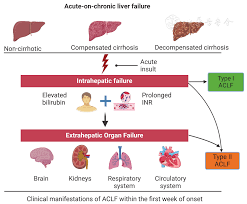Acute and Chronic Liver Failure Management: Comprehensive Care for Severe Liver Conditions
Liver failure occurs when the liver loses its ability to function properly. It can be acute (sudden onset) or chronic (long-term). Acute liver failure can progress rapidly and is a medical emergency. Chronic liver failure, on the other hand, develops over time due to liver diseases like cirrhosis, hepatitis, or fatty liver disease. Healtour Solutions helps connect you with top specialists in India for effective treatment, including liver transplant options.
Types of Liver Failure
- Acute Liver Failure (ALF):
Acute liver failure is a rapid decline in liver function, typically within a few days or weeks. It can be caused by factors such as viral infections, drug toxicity (especially paracetamol overdose), autoimmune hepatitis, and liver trauma. ALF can lead to severe complications like brain swelling (hepatic encephalopathy) and kidney failure. - Chronic Liver Failure (CLF):
Chronic liver failure occurs due to long-term liver damage, often caused by conditions like cirrhosis, hepatitis B or C, alcohol abuse, and non-alcoholic fatty liver disease (NAFLD). Over time, the liver becomes scarred, and its ability to function deteriorates. In advanced stages, CLF can lead to complications like portal hypertension, ascites (fluid buildup), and liver cancer.
Symptoms of Acute and Chronic Liver Failure
Symptoms of Acute Liver Failure:
- Sudden jaundice (yellowing of the skin and eyes)
- Rapidly worsening fatigue
- Nausea and vomiting
- Abdominal pain, particularly in the upper right side
- Confusion or disorientation (hepatic encephalopathy)
- Swelling in the legs or abdomen (ascites)
- Bleeding or bruising easily
Symptoms of Chronic Liver Failure:
- Persistent fatigue and weakness
- Jaundice
- Swelling in the abdomen or legs (ascites, edema)
- Unexplained weight loss
- Loss of appetite
- Itchy skin (pruritus)
- Confusion or changes in mental state
Causes and Risk Factors
Causes of Acute Liver Failure:
- Viral Infections: Hepatitis B, hepatitis C, or hepatitis E.
- Drug Toxicity: Overdose of medications like acetaminophen (paracetamol), certain antibiotics, or supplements.
- Autoimmune Disorders: Conditions where the immune system attacks liver cells.
- Alcohol Abuse: Excessive alcohol consumption can lead to ALF.
- Liver Trauma or Surgery Complications.
Causes of Chronic Liver Failure:
- Chronic Hepatitis B or C Infection: Leading to long-term liver damage.
- Cirrhosis: Scarring of the liver due to alcohol abuse, fatty liver disease, or viral infections.
- Non-Alcoholic Fatty Liver Disease (NAFLD): Fat buildup in the liver that progresses to cirrhosis.
- Hemochromatosis and Wilson’s Disease: Genetic disorders that cause liver damage.
- Obesity and Type 2 Diabetes: Can contribute to the progression of liver disease.
Diagnosis of Acute and Chronic Liver Failure
The diagnosis of liver failure is made through a combination of medical history, symptoms, and diagnostic tests, including:
- Blood Tests: To evaluate liver function, enzyme levels (ALT, AST), bilirubin levels, and clotting factors.
- Imaging Studies:
- Ultrasound: Detects liver enlargement, fluid buildup (ascites), and liver damage.
- CT or MRI: Offers detailed imaging to evaluate the liver and associated complications.
- Biopsy: In chronic liver failure, a biopsy may be performed to assess the degree of liver damage (cirrhosis).
- Liver Function Tests: Measures protein, bilirubin, and albumin levels to assess the liver's functionality.
- Endoscopy: For detecting complications like varices (enlarged veins) or internal bleeding.
Treatment Options for Acute and Chronic Liver Failure
Treatment varies depending on whether the liver failure is acute or chronic:
Acute Liver Failure Treatment:
- Medical Support: Immediate hospital care, including monitoring and supportive treatments for vital organs.
- Medications: To reduce toxins in the blood and manage symptoms (like encephalopathy).
- Liver Transplant: In cases where the liver cannot recover, a liver transplant may be necessary.
Chronic Liver Failure Treatment:
- Lifestyle Changes: Diet and alcohol cessation to slow down liver damage.
- Medications: To manage symptoms such as swelling, bleeding, and encephalopathy.
- Liver Transplant: In cases of end-stage liver failure where the liver cannot function adequately.
- Managing Underlying Conditions: Treating hepatitis or cirrhosis with antiviral drugs, immunosuppressants, or other specific treatments.
Role of Healtour Solutions in Liver Failure Management
Healtour Solutions connects patients with top specialists and hospitals in India for expert management of both acute and chronic liver failure. Our services include:
- Access to advanced liver care and treatment options
- Personalized treatment plans based on individual needs
- Liver transplant consultations and surgical interventions
- Post-treatment monitoring and ongoing care
Why Choose Healtour Solutions for Liver Failure Management in India?
- World-Class Expertise: We connect you with expert hepatologists and liver specialists in India.
- Comprehensive Care: From diagnosis to post-treatment recovery, we ensure every aspect of liver failure management is covered.
- Affordable and High-Quality Care: We offer cost-effective solutions without compromising on care quality.
- State-of-the-Art Facilities: Partnering with leading hospitals equipped with the latest technologies to offer the best treatment outcomes.
Step-by-Step Guide to Liver Failure Management
Step 1: Consultation and Diagnosis
- Meet with a specialist to discuss symptoms and medical history.
- Undergo blood tests, imaging, and possibly a biopsy to confirm diagnosis.
Step 2: Personalized Treatment Plan
- Based on your diagnosis, your doctor will recommend treatment options such as medications, lifestyle changes, or liver transplant.
Step 3: Treatment Options
- Acute Liver Failure: Medical support, medications, and possible liver transplant.
- Chronic Liver Failure: Managing underlying conditions, medications, and liver transplant.
Step 4: Post-Treatment Care
- Hospital stay for recovery and symptom management.
- Follow-up visits to monitor liver function and ensure proper healing.
Step 5: Long-Term Care
- Ongoing check-ups and lifestyle adjustments to improve liver health.
Step 6: Emotional Support
- Counseling and psychological support for patients and their families during treatment and recovery.
Step 7: Ongoing Monitoring
- Regular tests to track liver function and prevent complications.
At Healtour Solutions, we offer personalized care every step of the way for acute and chronic liver failure treatment.
Contact Us for Liver Failure Treatment
If you or a loved one is facing acute or chronic liver failure, Healtour Solutions can help you find the best treatment in India. Contact us today for a consultation and take the first step toward expert care and a personalized treatment plan.
FAQs About Liver Failure Treatment
- What is liver failure?
Liver failure occurs when the liver stops functioning properly, either suddenly (acute) or gradually (chronic). It may result from liver diseases like cirrhosis or hepatitis.
- What are the symptoms of liver failure?
Symptoms can include jaundice, fatigue, abdominal swelling, confusion, and easy bruising. Early detection is key to successful treatment.
- How is liver failure diagnosed?
Diagnosis involves blood tests, imaging studies, liver biopsies, and ammonia level tests to confirm liver function deterioration.
- What are the treatment options for liver failure?
Treatment may include medications, lifestyle changes, liver transplant, and managing underlying conditions like cirrhosis or hepatitis.
- Can liver failure be treated without a transplant?
In some cases, managing underlying conditions, medications, and lifestyle changes can help prevent progression. However, a liver transplant may be necessary in severe cases.
- Is liver transplant required for liver failure?
A liver transplant is often needed in cases of advanced liver failure where the liver cannot recover with other treatments.
- What role does diet play in liver failure treatment?
Dietary changes are crucial for managing liver failure. This includes avoiding alcohol, reducing sodium intake, and following a liver-friendly diet.
- Can liver failure be prevented?
Avoiding excessive alcohol, maintaining a healthy weight, getting vaccinated against hepatitis, and managing conditions like diabetes can help prevent liver failure.
- How long does it take to recover from liver failure treatment?
Recovery time depends on the severity of liver failure and the type of treatment. After liver transplant, recovery can take several months.
- How affordable is liver failure treatment in India?
Liver failure treatment in India is highly affordable compared to many Western countries, offering high-quality care at a fraction of the cost.




